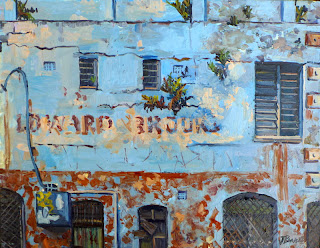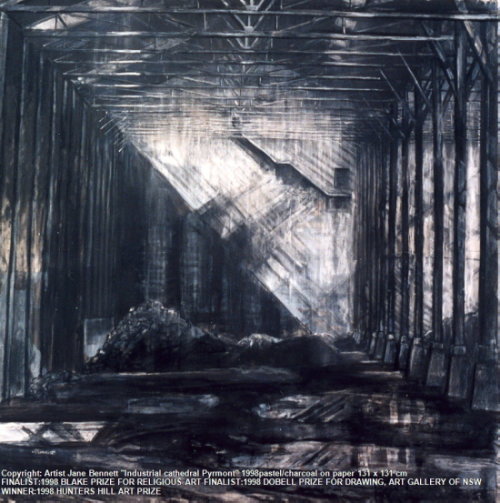I was asked by the National Trust After Hours Committee if I could help with a heritage walk "Macdonaldtown Meander" on Sunday 3rd March.
This was quite a challenge.
I have painted Macdonaldtown's majestic neighbour,the Eveleigh Railway Workshops many times,but Macdonaldtown itself had never appeared as an obvious source of inspiration.
But I was intrigued and decided to explore. I'm glad that I did. Often I can concentrate on more obviously spectacular vistas, and miss the subtle charms of smaller details, such as the exquisite series of classical heads as vignettes between each terrace in a row close to the start of Wilson Street.
Macdonaldtown's streets were full of delightful surprises.
This charming decorative corbel is carved into the classically inspired head of a lady. It separates a row of five 3 storey terraces at the western end of Wilson street. Some of them have been tastefully gentrified in harmonious neutral shades, while their neighbours sport shabby yet garish liquorice all-sorts colours.
The hot pink terrace on the right reminds me of the time in 1986 when a couple of local lads decided to beautify Macdonaldtown Station by painting it pink. All of it. Tables, chairs walls and even a pot plant were glued down and painted pink in an "overall effort to enhance the station". No conviction was recorded and the State Rail Authority's claim for damages was rejected by the Magistrate. I had hoped that the hot pink terrace had been occupied by these 2 intrepid painters, but they actually lived in Enfield at the time.
This charming decorative corbel is carved into the classically inspired head of a lady. It separates a row of five 3 storey terraces at the western end of Wilson street. Some of them have been tastefully gentrified in harmonious neutral shades, while their neighbours sport shabby yet garish liquorice all-sorts colours.
The hot pink terrace on the right reminds me of the time in 1986 when a couple of local lads decided to beautify Macdonaldtown Station by painting it pink. All of it. Tables, chairs walls and even a pot plant were glued down and painted pink in an "overall effort to enhance the station". No conviction was recorded and the State Rail Authority's claim for damages was rejected by the Magistrate. I had hoped that the hot pink terrace had been occupied by these 2 intrepid painters, but they actually lived in Enfield at the time.
 |
'The Lady of the house'
Row of terraces in Wilson street 2012 oil on canvas 18 x 13cm Available Enquiries about these paintings : |
Macdonaldtown, despite its freshly renovated railway station, is not actually a bona fide suburb.
It's a "locality". More of a state of mind, really. The slightly shabbier sister, always being dominated by her more prominent Newtown, St Peters, Enmore, Erskineville and Redfern.The hinterland ; with most of the local landmarks residing slightly outside her nebulous borders -the exciting King Street shopping strip; the funky CarriageWorks; the chimneys of the St Peters Brickworks; the Eveleigh Railway Workshops.
Macdonaldtown remains the almost invisible space in-between.
While painting in Macdonaldtown, I found most of her inhabitants actually denied living there. They lived in "Newtown", "South Newtown", "near Eveleigh", "west of CarriageWorks", "Hollis Park", "North Erskineville", even the marvellously convoluted "south of Wilson Street West". This could be influenced by the vagaries of real estate prices rather than dislike of the name Macdonaldtown.
Macdonaldtown mostly consisted of terrace houses of the
cheapest possible construction,generally 4 metres (13 ft) wide "two-up two-down"
with a rear kitchen.They usually had adjoining walls only one brick thick and a
continuous shared roofspace. Hundreds of these formerly humble dwellings still remain and are rapidly being gentrified. 19th century property developers would build a row terminating in a house of 1 1/2 width at
the corner of the street, to be used as a commercial premises, or
"Corner Store".
 |
'Someone to watch over me'
2012 oil on canvas 20 x 25cm
Enquiries about these paintings :
|
Only 1 person in the pub opposite had ever noticed it peering down at them!
 |
| 'Derelict 'Edward Brooks' factory in Wilson street 2012 oil on board 22 x 28cm |
The terraces at the northern and eastern end (closer to the University and the city) are as a rule far more prestigious than the workers cottages to the west and south, especially the row in Georgina Street and Warren Ball Avenue next to Hollis Park.
However, next to the very upmarket Hollis Park area, is the very large and very derelict 'Edward Brooks' factory, crumbling into Wilson Street. The winch above the window hints at its industrial past.
 |
'Edward Brooks building, Wilson Street' 2013 oil on canvas 46 x 92cm
Available Enquiries about these paintings : |
The former 'Edward Brooks building' was known locally, rightly or wrongly as the 'Hat Factory'. By the size of the winch hats (and presumably heads) were a lot bigger back in the good old days!
None of the locals have so far been able to tell me very much about its history. One man from the Erskineville Hotel, whose dad used to live 3 doors down, said that it was a foundry, which seems possible, although records show the "IronWorks" as being a block further west down the road at no. 150 Wilson Street.
His dad, like so many of the former residents of Macdonaldtown's workers terraces, was an employee of the Eveleigh Railway Workshops.Built in 1878, the Eveleigh Railway yards housed the Government Railway Stores
and Workshops, and the Locomotive Engineer’s Department from 1901. Production declined in the 1970s and ceased in 1988. The site lay mostly disused
til 1996 when the northern (Darlington) end was developed for a communications
and science research facility known as the Australian Technology Park. In 2002 the central part of the north-eastern site became the too cool for school Carriageworks performance space. The forecourt hosts weekly farmers' markets
and monthly craft markets.  |
| 'Pediment with wheat sheaf- old Henninges bakery in Wilson street - now 'Original Finish' 2012 oil on canvas 20 x 20cm |
Enquiries about these paintings :
The wheat sheaf on the pediment, reveals the original use of 'Original Finish' as a bakery.
The former Newtown Bread Factory, on the corner of Wilson and Watkin Streets, was run by Henry Henninges in the 19th century.The lane behind the factory still bears Henninges' name.
The building has been very sympathetically and respectfully restored, with small cracks and weathering bearing witness to its previous history,which is appropriate considering that its current occupier, 'Original Finish' specializes in antiques.
Henry Henninges Bakery in 1983
The former 'Edward Brooks building had been occupied by squatters since about 2001.
The building had last changed hands (for a derisively small amount of money) in 1981. The owner apparently only lives a few blocks down the road, but allowed the property to rot, in a similar fashion to the Terminus Hotel and the Darling Island Bond and Free Store of Pyrmont. Landbanking played as an extreme sport.
Nature abhors a vacuum, so a variety of squatters and local community groups had apparently moved in.
They were forcibly evicted in a very heavy handed fashion by the riot squad on Thursday 31st July 2014.
The once-shunned building has now been bought for $1.7 million at a hotly contested auction and will now apparently be renovated rather than demolished.
The former 'Edward Brooks building had been occupied by squatters since about 2001.
The building had last changed hands (for a derisively small amount of money) in 1981. The owner apparently only lives a few blocks down the road, but allowed the property to rot, in a similar fashion to the Terminus Hotel and the Darling Island Bond and Free Store of Pyrmont. Landbanking played as an extreme sport.
Nature abhors a vacuum, so a variety of squatters and local community groups had apparently moved in.
They were forcibly evicted in a very heavy handed fashion by the riot squad on Thursday 31st July 2014.
The once-shunned building has now been bought for $1.7 million at a hotly contested auction and will now apparently be renovated rather than demolished.


No comments:
Post a Comment